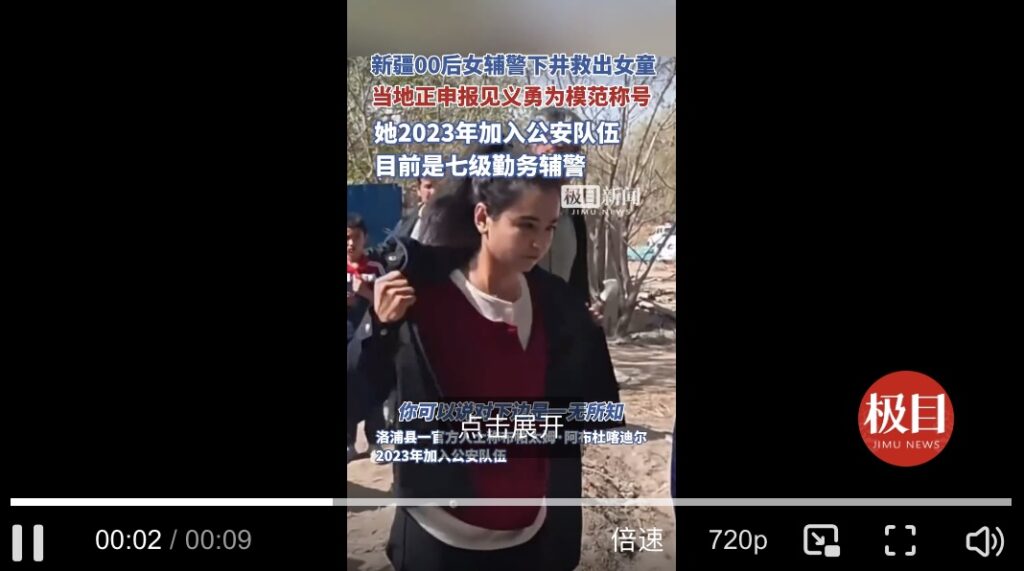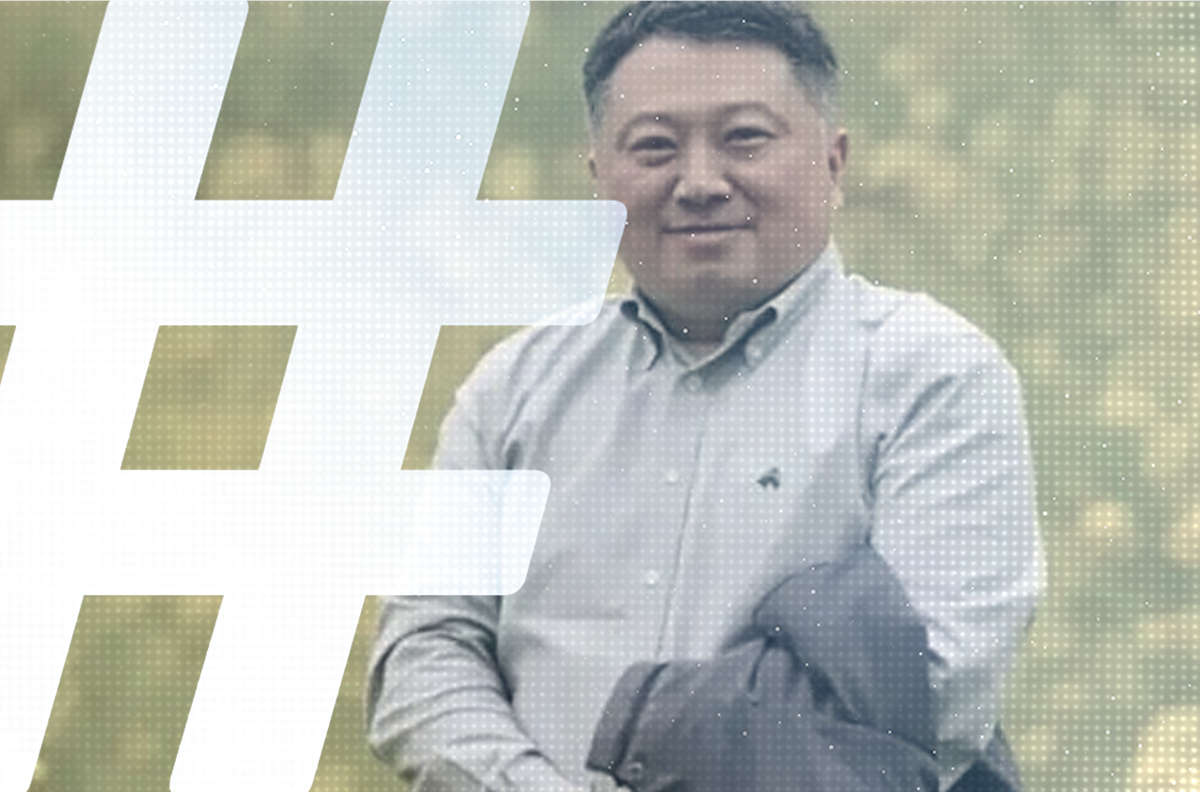
Earlier this month, state media across China went into overdrive to share the heart-stopping story of how Bupatam Abdukader, a 24-year-old female police officer in Xinjiang, had descended 40 meters into a narrow well to rescue a toddler, after attempts with conventional rescue equipment had reportedly failed. Dramatic video footage from the scene showed the officer stepping forward toward the perilous shaft, barely 40 centimeters wide, as she removed her jacket and said: “I’m thin, let me go down!”
Cue the tales of heroism and self-sacrifice, standard fare for official rescue reports in China’s tightly controlled media environment, which tend to play down questions of readiness and responsibility. State media related how Bupatam, who is from Luopu County in the region’s Hotan Prefecture, had battled oxygen and tight confines — maintaining consciousness through deep breathing techniques — to bring the small girl up from the muddy bottom of an abandoned well. “When I touched the child in the well, she grabbed my finger. Her hand was so cold, yet so strong,” she recalled emotionally to the reporters waiting above ground. “I had only one thought, to get the child up first.”
As the dramatic rescue footage captured attention across the country, including video footage showing Bupatam as she finally emerged, covered head-to-toe in mud, local officials made the most of the opportunity. They presented the officer with a reward of 10,000 yuan and nominated her for the county’s “Model of Bravery” (见义勇为模范) honor.
But as admiration for her heroism spread across Chinese social media, the conversation shifted rather suddenly to questions about Bupatam Abdukader’s employment status. In media reports, she was referred to generally as a “female auxiliary officer” (女辅警), making clear to the news-reading audience that she was a member of the “auxiliary police” (辅助警察) — meaning that rather than being under formal hire, she was support personnel for the regular police force, receiving inferior pay and benefits.

Why, netizens wondered, should someone who had displayed such immense courage receive fewer benefits and less compensation than her formally employed counterparts?
Typically, unlike formal police officers with what are known as “established positions,” or bianzhi (编制), auxiliary officers receive lower salaries, reduced benefits, less job security, and fewer promotion opportunities despite the fact that they do the same work and face the same risks.
China’s two-tier system for police and rescue work has frequently become a point of social debate. One of the most egregious examples came to the fore nearly 10 years ago as a fire at a chemical storage facility in the city of Tianjin erupted as a massive explosion that killed 173 people. Many of the dead were firefighters later found to have been auxiliaries under part-time contracts.
As the officer’s heroic act in Xinjiang made the headlines, netizens pounced on the opportunity to reopen the longstanding debate about the gap between “official” and “auxiliary” status. “She should be given a formal position!” wrote one user. Another asked directly: “Why not give her a permanent position?”
On April 24, just over a week after the rescue, local authorities announced she would be “exceptionally promoted” from seventh to fifth rank within the auxiliary system. The announcement seemed only to throw the gap into sharper relief. While significant, the promotion maintained the officer’s auxiliary status rather than granting her formal employment.
As public pressure mounted, the Xinjiang government made an announcement through its official “Xinjiang Release” (新疆发布) account on social media channels in which it sought to rationalize the process of converting auxiliary hires to formal positions. Such a transition, it said, needed to follow strict procedures, including civil service examinations, merit-based special recruitment, and targeted recruitment programs.
“Bupatam is undoubtedly a hero,” the statement read, “but compared to the beautiful wish for ‘special handling,’ strictly following legal regulations for ‘conversion to permanent status’ requirements and serious, prudent merit recognition is what represents fairness and justice to all formal police officers and auxiliary police like her who fight on the public security front in various fields, selflessly protecting people’s lives and property.” In other words, the decision to keep Bupatam and others like her in “auxiliary” status, according to the statement, was about “system design.” And ultimately, the procedural approach prevented “favoritism and corruption to the greatest extent.”
In many respects, the statement was a distraction from the obvious. As state media are well aware, the highly discriminatory nature of China’s two-tiered employment system has been repeatedly and conclusively documented — and even, despite the country’s highly controlled media environment, talked about.
Six years ago, a report in China Comment (半月谈), an official journal under the government’s Xinhua News Agency, found significant pay disparities between auxiliary and formal hires. The latter were generally paid three times more for a marginally larger workload. And despite the fact that they remained essential, China Comment found that auxiliary officers experienced a profound lack of belonging (归属感) and social recognition, ultimately undermining the stability of the workforce and the effectiveness of the public security system.
This time around, mindful perhaps of the potential volatility of growing public calls to improve the status of an ethnic Uighur auxiliary officer, China Comment got behind authorities in Xinjiang. The journal praised the official response as exemplary crisis management that balanced institutional constraints with public sentiment, noting how it demonstrated that officials could find “the greatest common denominator” when navigating the tension between emotional appeals and regulatory frameworks. Echoing this sentiment, the state-run China Central Television commended the way officials, as it said, “did not avoid public expectations” but “explained facts and reasoning” while maintaining “respect for the hero.”
The mini storm of discussion prompted this month by the heroics of Bupatam Abdukader reveals how a story of dramatic rescue — or any story, in fact — can quickly transform into a platform for broader social debates about equality and fairness. But it equally reveals how rapidly and effectively such debates can be managed by the state, using the means of restraint and amplification at its disposal.
At its core, Bupatam’s story is about a gap in visions of what heroism means, and how it should be rewarded. While public sentiment called for the officer’s brave human acts to be rewarded with real and tangible benefits, and the dignity that comes with truly equal status, the authorities managed to contain her within the Party’s limited vision of heroism. In that vision, the hero’s extraordinary sacrifice works only to serve and preserve the system — even if that system is premised on the most ordinary perpetuation of inequalities.




















